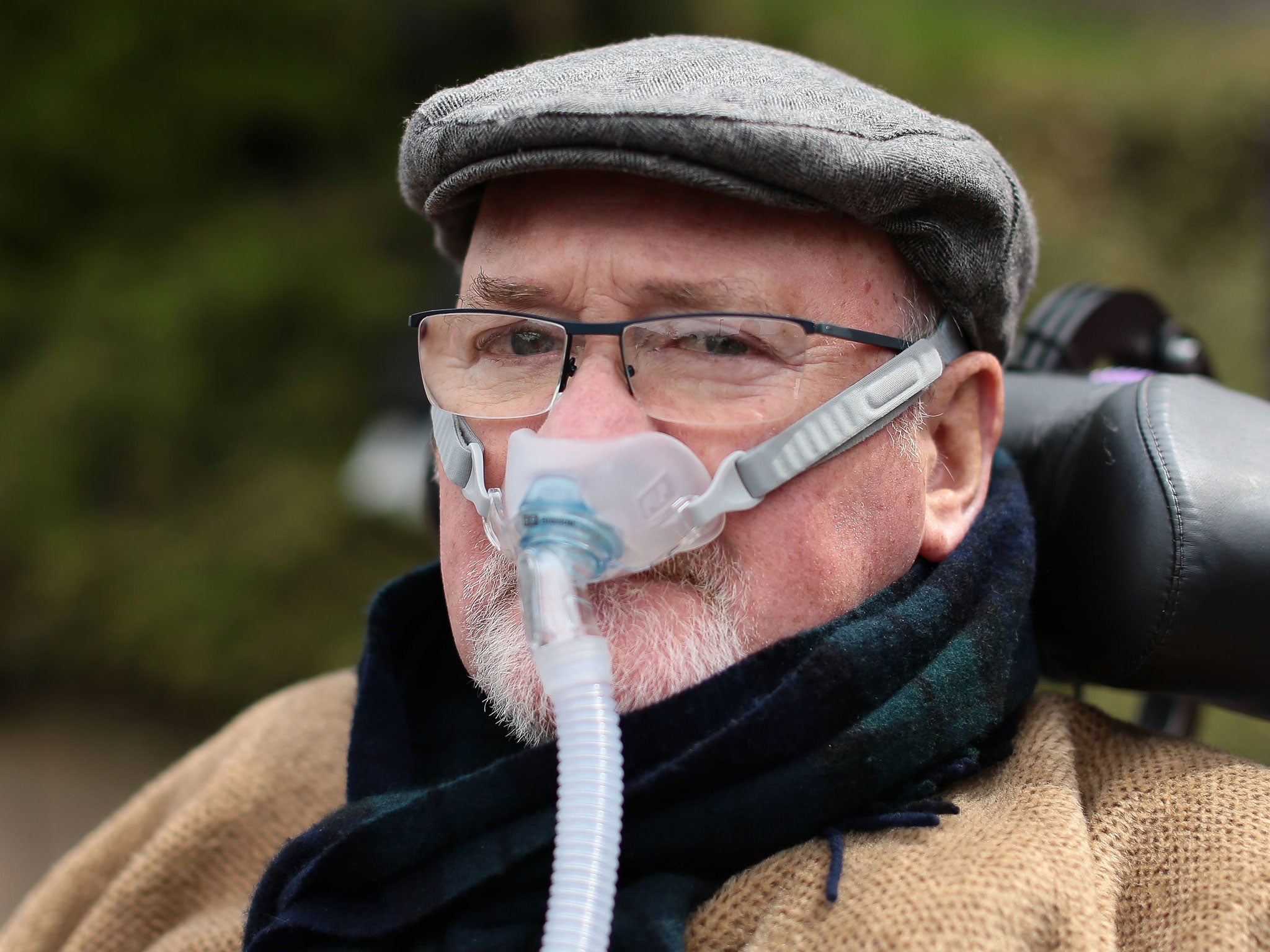Terminally ill man loses latest round of legal battle against UK's ban on assisted dying
Judges say Parliament is best-placed to decide whether law is 'necessary and proportionate'

A man with terminal motor neurone disease has lost the latest round of his legal challenge to overturn the “blanket ban” on assisted dying in Britain.
Noel Conway, 68, says he feels “entombed” by his illness and is fighting for the right to choose a “peaceful and dignified” death.
His lawyers argued that the current law is incompatible with parts of the European Convention on Human Rights which guarantee respect for private and family life and protect against discrimination.
But the case was rejected by three senior judges at the Court of Appeal, meaning Mr Conway will have to take the case onwards to the Supreme Court.
A summary of the ruling by Master of the Rolls Sir Terence Etherton, Sir Brian Leveson and Lady Justice King said the court concluded it is not as well placed as Parliament to determine the “necessity and proportionality of a blanket ban”.
Sir Terence said Mr Conway's previous bid at the High Court heard evidence that could find that Mr Conway's proposed scheme was “inadequate to protect the weak and vulnerable” and failed to give enough weight to the “moral significance of the sanctity of life and to the scheme's potential to undermine relations of trust and confidence between doctors and their patients”.
“From the outset, we emphasise our great respect for him and for the dignity and courage which he has shown,” he added.
Mr Conway, a retired college lecturer from Shropshire, wants to be helped to die when he has less than six months left to live and the mental capacity to make a decision that is ”voluntary, clear, settled and informed“.
He proposed that he could only receive assistance, violating the Suicide Act 1961, if a High Court judge determined that he met all three of those criteria.
While Parliament abolished the law making suicide a crime, it maintained the prohibition on encouraging or assisting someone to kill themselves.
Representing Mr Conway at the Court of Appeal, Nathalie Lieven QC said the ban interferes with his rights and added judges must decide whether that is ”justified and proportionate“.
”Mr Conway is dying because of the effects of his illness - any change in the law could not, itself, increase the number of those with terminal illnesses,” she added.
“It could not therefore, per se, give rise to any increase in risk of death amongst (for instance) those with disabilities who are not terminally ill, and hence any wider risk to the general community.”
Mr Conway, who was too unwell to travel to London for the hearing, said the judgement was disappointing but “not unexpected” and vowed to appeal.
“This illness has already taken away my ability to breathe independently and I am now almost completely immobile,” Mr Conway added.
“I know it will also rob me of my life, and I have accepted that. But what I cannot accept are the options I am faced with under the current law…I will keep fighting for myself and all terminally ill people who want the right to die peacefully, with dignity and on our own terms.”
After being diagnosed with amyotrophic lateral sclerosis (ALS) in 2014, he is now dependent on a ventilator for up to 23 hours a day and only has movement in his right hand, head and neck.
He cites his current “barbaric” options as to effectively suffocate by choosing to remove his ventilator, kill himself at home or spend thousands travelling to Switzerland to end his life and have his family risk prosecution.
His solicitor Yogi Amin, partner and head of public law and human rights at Irwin Mitchell, said there were alternatives to a blanket ban on assisted dying.
“Noel has proposed a new legal framework for terminally ill people with robust safeguards,” he added. “The world has changed phenomenally in the past few decades with many medical advances but the law on assisted dying for those who are terminally ill hasn’t changed for more than 50 years.”
The campaign group Dignity in Dying, which supported the appeal, was bolstered by the Court of Appeal’s finding that judges could declare current laws incompatible with human rights.
Chief executive Sarah Wootton noted that areas of the US, Canada and Australia were already moving towards new assisted dying laws.
“Because our Government has so far failed to do so, Noel is being forced to spend his final months fighting in the courts for his fundamental rights,” she said. “We extend our thanks and appreciation to Noel and his family for their dedication and will continue to support them every step of the way.”
The appeal was opposed by the Justice Secretary, with Humanists UK, Care Not Killing and Not Dead Yet UK also making submissions.
Dr Peter Saunders, campaign director of Care Not Killing, said: “This sensible decision by the Court of Appeal yet again recognises that the safest law is the one we already have - a complete ban on assisted suicide and euthanasia.
”Our laws deter the exploitation, abuse and coercion of vulnerable people, who as we have seen in the US states of Oregon and Washington often cite feeling they have become a financial, or care burden as the reason for ending their lives.“
Additional reporting by PA
Subscribe to Independent Premium to bookmark this article
Want to bookmark your favourite articles and stories to read or reference later? Start your Independent Premium subscription today.

Join our commenting forum
Join thought-provoking conversations, follow other Independent readers and see their replies